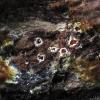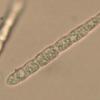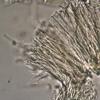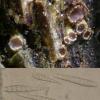
02-02-2026 21:46
Margot en Geert VullingsOn a barkless poplar branch, we found hairy discs

07-02-2026 20:30
 Robin Isaksson
Robin Isaksson
Hi!Anyone that have this one and can sen it to me?

25-01-2026 23:23
Hello! I found this species that resembles Delitsc

05-02-2026 15:07
Found on a fallen needle of Pinus halepensis, diam

05-02-2026 06:43
Stefan BlaserHello everybody, Any help on this one would be mu

18-08-2025 15:07
 Lothar Krieglsteiner
Lothar Krieglsteiner
.. 20.7.25, in subarctic habital. The liverwort i

02-02-2026 14:55
 Andgelo Mombert
Andgelo Mombert
Bonjour,Sur thalle de Lobaria pulmonaria.Conidiome

02-02-2026 14:33
 Andgelo Mombert
Andgelo Mombert
Bonjour,Sur le thalle de Peltigera praetextata, ne
Stictis
Bometon Javier,
16-12-2013 21:16
 En madera de Quercus.
En madera de Quercus.Tamaño 0,5 mm
Ascas 50-60 um IKI-
Esporas de 35-48 X 4-5um, con 7- 9 septos
Parafisis filiformes y ramificadas, no azulean con IKi
Alguna idea?
Gracias y saludos
Javier
Daniel Ghyselinck,
16-12-2013 21:32
Re : Stictis
Bonjour Javier,
Regarde du côté de Cryptodiscus rhopaloides, il me semble que la microscopie correspond assez bien. C'est une espèce assez commune sur écorce de feuillus. Les spores sont un peu grandes, mais j'ai aussi des récoltes avec des spores jusque 47 µm.
Amitiés,
Daniel
Regarde du côté de Cryptodiscus rhopaloides, il me semble que la microscopie correspond assez bien. C'est une espèce assez commune sur écorce de feuillus. Les spores sont un peu grandes, mais j'ai aussi des récoltes avec des spores jusque 47 µm.
Amitiés,
Daniel
Martin Bemmann,
16-12-2013 21:35

Re : Stictis
Hi Javier,
with these clavate spores (fig. 3) consider Cryptodiscus.
Regards
Martin
Update: Daniel seems to have the same thoughts. But I must admit that Zotto (in a circulating paper) excluded Cryptodiscus rhopaloides from this genus in his comments on Breitenbach&Kränzlin 1984, as well Baloch et al 2009 did.
with these clavate spores (fig. 3) consider Cryptodiscus.
Regards
Martin
Update: Daniel seems to have the same thoughts. But I must admit that Zotto (in a circulating paper) excluded Cryptodiscus rhopaloides from this genus in his comments on Breitenbach&Kränzlin 1984, as well Baloch et al 2009 did.
Bometon Javier,
16-12-2013 22:41

Re : Stictis
Muchsas gracias, Daniel y Martin
Saludos
Javier
Saludos
Javier
Hans-Otto Baral,
16-12-2013 23:04

Re : Stictis
Yes, there are two species rather common, rhopaloides and the less common idaei which has narrower spores than rhopaloides. Both are very closely related, and belong in Karstenia. By the way, Lugol provokes a red reaction to the entire hymenium, with a faint blue running ahead. After KOH treatment the hymenium stains deep blue in iodine.
My maximum was actually 50 µm, but with spores strongly clavate and hardly constricted at septa.
C. rhopaloides is also known as Ramonia interjecta, being probably erroneously thought to be a lichen.
Zotto
My maximum was actually 50 µm, but with spores strongly clavate and hardly constricted at septa.
C. rhopaloides is also known as Ramonia interjecta, being probably erroneously thought to be a lichen.
Zotto
Daniel Ghyselinck,
17-12-2013 18:23
Re : Stictis
Thanks for these very precise information (as usual), Zotto.
Daniel
Daniel
Bometon Javier,
17-12-2013 21:54

Re : Stictis
Muchas Gracias Zotto, por tus excelentes explicaciones.
Saludos
Javier
Saludos
Javier





